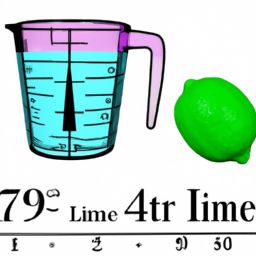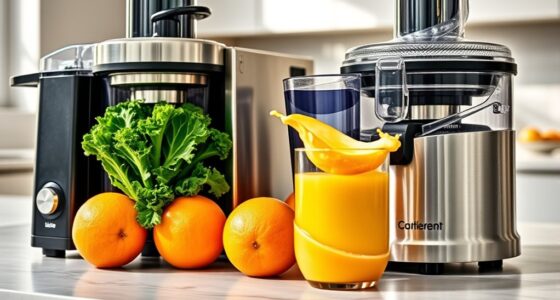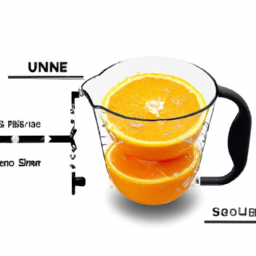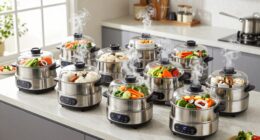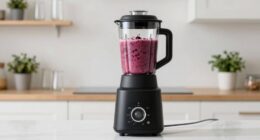As a fan of making my own green juice, I understand the importance of knowing how long it stays fresh. Green juice is packed with nutrients, vitamins, minerals, and antioxidants, making it an essential drink. However, enjoying it while it’s still fresh is crucial to reap all of its healthy benefits.
The shelf life of homemade green juice depends on several factors, including the ingredients used, the storage method, and the temperature. In this article, I will discuss how to determine the lifespan of your green juice, how to store it properly, and how to tell if it has gone bad.
I will also provide tips on how to extend the lifespan of your green juice and make the most of your homemade beverage. By the end of this article, you’ll have all the information you need to ensure that your green juice stays fresh and delicious for as long as possible.
Key Takeaways
- Homemade green juice should be consumed fresh to maximize health benefits.
- Proper storage is crucial to maintain freshness and nutritional benefits.
- Airtight containers should be used for storage and refrigerated immediately after making in the coldest part of the fridge.
- Homemade green juice should be consumed within 24-48 hours of making, or frozen with proper techniques to extend shelf life and preserve nutrients.
The Importance of Knowing the Shelf Life of Homemade Green Juice
It’s crucial to know how long your homemade green juice is good for, so you don’t end up drinking something that’s gone bad! This is especially important if you’re trying to reap the benefits of consuming fresh green juice.
Incorporating green juice into your daily routine can help you increase your vegetable and fruit intake, boost your immune system, and improve your digestion. However, green juice has a limited lifespan, and drinking it past its expiration date could lead to food poisoning.
To make sure you’re getting the most out of your homemade green juice, it’s important to consume it while it’s fresh. In the next section, we’ll explore the factors that affect the lifespan of green juice and how you can extend its shelf life.
Factors Affecting the Lifespan of Green Juice
You’ll want to keep in mind a few things to make sure your refreshing concoction stays fresh and nutritious for as long as possible. The following factors can affect the lifespan and quality of your homemade green juice:
-
Ingredients: The type and quality of the fruits and vegetables you use can affect the taste and nutritional benefits of your green juice. Choose fresh, organic produce and avoid using overripe or spoiled ingredients.
-
Extraction method: The way you extract the juice can also affect its lifespan and nutritional value. Cold-pressed juicing methods are known to preserve more nutrients and enzymes than traditional juicers.
-
Storage conditions: Proper storage is crucial to maintaining the freshness and nutritional benefits of your green juice. Exposure to light, heat, and air can cause the juice to oxidize and lose its nutrients.
It’s important to consider these factors when making homemade green juice to ensure that you’re getting the most out of your ingredients.
In the next section, we’ll discuss how to store your green juice to extend its lifespan.
How to Store Homemade Green Juice
To keep your refreshing concoction fresh and nutritious, follow these tips for storing your homemade green juice like a pro.
Firstly, you should always use airtight containers to store your green juice. This helps to prevent exposure to air and keeps the juice fresh for a longer period of time. Mason jars or other glass containers with tight-fitting lids are ideal for this purpose.
Secondly, it’s important to refrigerate your green juice immediately after making it. This helps to slow down the growth of bacteria and other microorganisms that can cause spoilage. You should also keep your stored juice away from light and heat, as these factors can reduce the nutrient content and freshness of your green juice.
By following these simple storing techniques, you can ensure that your homemade green juice stays fresh and delicious for as long as possible.
If you notice any changes in the appearance or smell of your green juice, it may be a sign that it’s gone bad. In the next section, we’ll discuss the telltale signs that your green juice has gone bad and how to dispose of it properly.
Signs that Your Green Juice Has Gone Bad
If your refreshing and nutritious homemade green juice starts to smell sour or look cloudy, it’s a clear sign that it has gone bad. These are the most common signs that your green juice has started to spoil, and it’s essential to dispose of it immediately. Spoiled green juice can cause food poisoning, which can lead to nausea, vomiting, and diarrhea. So, it’s crucial to consume fresh green juice or discard it if it starts to show any signs of spoilage.
There are ways to prevent spoilage and keep your homemade green juice fresh for a more extended period. It’s best to store your green juice in an airtight container and refrigerate it soon after making it. If you plan to drink it later, make sure to consume it within 24 hours.
Drinking fresh green juice has numerous benefits, including boosting your immune system, promoting healthy digestion, and reducing inflammation. So, it’s essential to consume it when it’s fresh to reap the maximum benefits.
In the next section, we’ll discuss how long you can store green juice in the refrigerator.
How Long Can You Store Green Juice in the Refrigerator?
Storing your fresh green juice properly is key to making it last longer in the refrigerator. It’s recommended to drink homemade juice within 24-48 hours of making it, but there are ways to extend its shelf life. Here are some tips to keep in mind when storing your green juice:
- Always use an airtight container to prevent exposure to air and bacteria.
- Store your juice in the coldest part of the refrigerator, preferably at 38-40°F.
- Avoid shaking the container as this can cause oxidation and spoil the juice.
- If you notice any change in color, texture, or smell, discard the juice immediately.
If you’re new to juicing, it’s important to experiment with different recipes to find what works best for you. There are countless creative recipe ideas available online, from green juices made with kale and spinach to fruit-based blends with mango and pineapple. Don’t be afraid to mix and match ingredients to find your perfect blend.
Now that you know how to store your green juice in the refrigerator, you may be wondering if it’s possible to freeze it for even longer storage. Let’s explore this in the next section.
Can You Freeze Green Juice?
I’ve been exploring different ways of preserving green juice, and one of the methods that came up was freezing.
Freezing green juice has its pros and cons, and it’s essential to know them before deciding to freeze your juice. If done correctly, freezing can help prolong the shelf life of your green juice and save you time. However, freezing can also affect the texture and taste of your juice, so it’s crucial to know the right way to freeze and thaw it.
Pros and Cons of Freezing
Freezing homemade green juice can be a convenient option for you if you want to enjoy it for longer periods of time without compromising its nutritional value. However, it’s important to weigh the benefits and drawbacks before deciding to freeze your juice. Here are some pros and cons:
-
Benefits:
-
Freezing preserves the nutrients and enzymes in the juice, which can help retain its nutritional value.
-
You can make a large batch of juice and freeze it for later use, which can save you time and effort in the long run.
-
Frozen juice can be a great option for those who don’t have access to fresh produce year-round.
-
Drawbacks:
-
Freezing can alter the taste and texture of the juice, making it less palatable than fresh juice.
-
If not frozen properly, the juice can develop ice crystals or freezer burn, which can impact its overall quality.
-
Some studies suggest that freezing can lead to a loss of vitamins and minerals in the juice, although the extent of this loss is still unclear.
Overall, freezing homemade juice can be a good option for those who want to extend its shelf life. However, it’s important to consider the potential drawbacks before making this decision.
When it comes to freezing green juice, there are a few key steps you should follow to ensure that it stays fresh and tasty. But before we dive into those details, let’s first explore how long homemade green juice can last in the fridge and freezer.
How to Freeze Green Juice
To keep your green juice fresh, you’ll want to transfer it into a freezer-safe container with a tight-fitting lid, like a mason jar or a plastic container. It’s important to note that using a container that’s too big can actually cause your juice to freeze more slowly, leading to the formation of ice crystals and a decline in quality.
A good rule of thumb is to leave about an inch of space at the top of the container for the juice to expand as it freezes. Before freezing, make sure to label the container with the date and contents.
When freezing green juice, there are a few techniques you can use to ensure the best quality. One technique is to freeze the juice in ice cube trays, which can be convenient for portioning out smaller amounts of juice for smoothies or other recipes. Another technique is to freeze the juice in individual portions, which can be useful if you plan to take the juice on-the-go.
No matter which technique you use, it’s important to prepare the juice for freezing by stirring it well and removing any air bubbles.
When it’s time to thaw your frozen green juice, you’ll want to do it slowly in the refrigerator overnight, or by placing the container in a bowl of cold water. Avoid thawing the juice at room temperature or in the microwave, as this can cause the juice to lose some of its nutritional value and flavor.
How to Thaw Frozen Juice
When thawing frozen juice, it’s best to do it slowly in the refrigerator or by placing the container in a bowl of cold water, avoiding room temperature or microwave methods. Thawing the frozen juice slowly will ensure that the nutrients and enzymes are not compromised.
Here are some thawing tips to help you preserve the quality of your frozen green juice:
- Thaw the juice in the refrigerator overnight.
- Place the frozen juice container in a bowl of cold water for a quicker thawing process.
- Avoid thawing the juice at room temperature or using a microwave.
Following these freezing techniques and thawing tips will help maintain the quality and flavor of your homemade green juice. However, to extend the lifespan of your juice, there are additional steps you can take.
How to Extend the Lifespan of Homemade Green Juice
You don’t want your homemade green juice to turn into a wilted flower, so treat it like a precious gem by storing it properly. To extend the lifespan of your homemade green juice, there are a few tips you can follow. First, make sure to store it in an airtight container to prevent oxidation and spoilage. Glass jars with tight-fitting lids are ideal for this purpose. Second, refrigerate your green juice immediately after making it. This will slow down the decomposition process and preserve its freshness for longer. Third, consider adding a small amount of lemon juice or apple cider vinegar to your green juice before storing it. These natural preservatives can help prevent the growth of harmful bacteria and extend the lifespan of your juice even further.
When it comes to maintaining the nutritional value of your green juice, there are a few things to keep in mind. For starters, try to drink your juice as soon as possible after making it. This will ensure that you’re getting the maximum amount of nutrients from the fresh produce. Additionally, consider adding some superfoods to your green juice to boost its nutritional profile even further. Some great options include spirulina, wheatgrass, and chia seeds. Finally, try to drink your green juice on an empty stomach, preferably in the morning. This will help your body absorb the nutrients more efficiently and give you a natural energy boost to start your day.
In order to make the most of your homemade green juice, there are a few additional tips you can follow. These include experimenting with different flavor combinations, using organic produce whenever possible, and investing in a high-quality juicer. By following these tips, you can ensure that your homemade green juice is not only delicious and nutritious, but also has a longer lifespan and is packed with all the essential vitamins and minerals your body needs.
Tips for Making the Most of Your Homemade Green Juice
Maximizing the benefits of your homemade green juice involves incorporating superfoods, experimenting with flavor combinations, and investing in a quality juicer.
Adding superfoods such as chia seeds, spirulina, and wheatgrass can boost the nutritional value of your green juice. These superfoods are packed with vitamins, minerals, and antioxidants that can improve your overall health and well-being.
Aside from adding superfoods, experimenting with different flavor combinations can make your green juice more enjoyable. You can try adding fruits such as apples, pineapples, or berries to your green juice for a sweeter taste.
Investing in a quality juicer can also make a significant difference in the quality and taste of your green juice. Some juicers have specific settings for leafy greens, which can help extract more juice and nutrients. Creative recipe ideas and juicing equipment recommendations can be found online or through health and wellness stores.
Drinking spoiled green juice can pose health risks such as food poisoning, stomach cramps, and diarrhea. It’s important to always check the expiration date and smell your green juice before drinking. If it smells sour or off, it’s best to throw it out to avoid any potential health risks.
Taking the time to make the most out of your green juice can be beneficial for your health, but it’s important to also prioritize safety and caution when consuming homemade juices.
Health Risks Associated with Drinking Spoiled Green Juice
Drinking spoiled green juice can be dangerous and cause serious health issues, including food poisoning and stomach cramps. As a virtual assistant, it is important for me to inform you that consuming expired homemade green juice can lead to infections caused by bacteria, viruses, and parasites. These microorganisms can grow in the juice if it is not stored properly or consumed within a certain timeframe.
To prevent illnesses, it is important to know how long homemade green juice lasts. The following table provides a guideline for safe consumption of homemade green juice:
| Type of Juice | Refrigerator Storage | Freezer Storage |
|---|---|---|
| Fresh Green Juice | 3-5 days | Not recommended |
| Cold-Pressed Green Juice | 3-4 days | 2-3 months |
| Blender Green Juice | 1-2 days | Not recommended |
It is important to note that the above table is a general guideline and the actual storage time may vary depending on factors such as the ingredients used, temperature, and storage conditions. To ensure the safety of your homemade green juice, it is recommended to consume it as soon as possible and store it in a clean and tightly sealed container in the refrigerator. By following these guidelines, you can enjoy the health benefits of homemade green juice without the risk of getting sick.
Frequently Asked Questions
What are some common ingredients used in homemade green juice recipes?
I often use kale, collard greens, or Swiss chard as spinach alternatives in my homemade green juice. Juicing different colored vegetables provides a wide range of nutrients and health benefits, including antioxidants and anti-inflammatory properties.
Is it necessary to use organic produce when making homemade green juice?
Using organic produce for homemade green juice is beneficial because it avoids harmful chemicals and pesticides. However, non-organic produce can still provide nutrients at a more cost-effective price. It’s important to weigh the benefits and costs when making a decision. As they say, you get what you pay for.
Can I store my homemade green juice in a glass container instead of plastic?
Yes, you can store homemade green juice in a glass container instead of plastic. Glass is a better option as it is non-toxic and doesn’t contain harmful chemicals. The shelf life in the fridge is typically 24-72 hours.
How often should I drink homemade green juice to see health benefits?
So you want to know how often to guzzle down some homemade green juice for maximum health benefits? Incorporating this liquid gold into your workout routine can improve skin health and overall wellness. Drink up!
Are there any potential side effects of consuming homemade green juice regularly?
Regular consumption of homemade green juice can have potential risks such as increased sugar intake and interactions with medications. Moderation limits should be followed. Evidence suggests drinking 1-2 servings per day.
Conclusion
In conclusion, understanding the shelf life of homemade green juice is crucial in maintaining its quality and nutritional value. Factors such as temperature, light exposure, and air contamination can significantly affect the lifespan of your juice. Proper storage in airtight containers and refrigeration can extend the shelf life of your green juice up to five days. However, if you see any signs of spoilage, discard the juice immediately to avoid any health risks.
Interestingly, according to a study published in the Journal of Food Science, the antioxidant activity of fresh green juice decreases by 40% after three days of refrigeration. This finding highlights the importance of consuming green juice as soon as possible to obtain maximum health benefits.
Therefore, if you are making homemade green juice, it’s best to consume it within 24 hours of preparation. By following the tips and guidelines mentioned in this article, you can enjoy the benefits of fresh, homemade green juice without compromising its quality and nutritional value.

